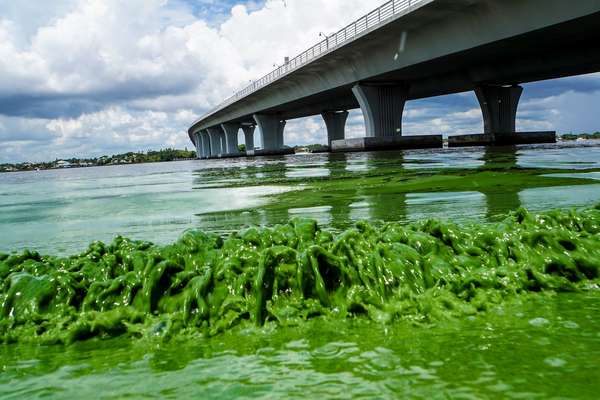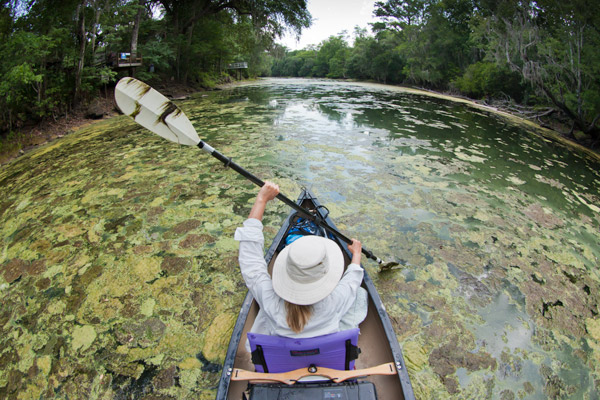With a state of emergency covering four Florida counties, the stench and slime from toxic blue-green algae blooms in the state are covering the international media. It’s not a sweet sight – but it smells conspicuously like sugar. Big Sugar, to be exact.
Environmental scientists and experts tirelessly point to agricultural pollution and climate change as major contributors to the monster algae epidemic, but, incredulously, Florida’s political leaders just haven’t figured it out.

Rubio Covers Big Sugar’s Big Butt
Tied a bit too closely to the purse strings of one of Central Florida’s main industries, a top state politician denies that runoff from sugar fields is a major contributor to Lake Okeechobee’s agricultural pollution. Returning home for the 4th of July holiday weekend, Florida Republican Senator Marco Rubio did his best to cover Big Sugar’s big butt. “If I believe[d] that the sugar industry was the only contributor to this,” said Rubio, then we would do everything possible to address that immediately, but there are multiple contributors to this and it’s not just agriculture.”
Alan Farago, president of Friends of the Everglades, states that Rubio has received “multiple, six-figure” donations from the sugar industry for working on behalf of Big Sugar. “In 2003,” reports Farago, “Rubio was a whip for Gov. Jeb Bush on a bill lowering Everglades water quality standards crowd-swarmed by sugar lobbyists. That new law was successfully challenged by Friends of the Everglades and the Miccosukee Tribe in federal court but caused a decade delay in water quality improvements, setting up today’s disaster.”
Thanks to Rubio’s efforts, local industries have enjoyed free access to Lake Okeechobee as a dumping site for a toxic stew of chemicals, fertilizers, and animal manure. Earthjustice, an environmental law group, has been fighting this situation for years. David Guest, Managing Attorney for Florida’s Earthjustice branch, recently referred to southern Florida’s large inland lake as a “toilet.”
Guest says, “It’s well established by now that a city can’t just dump sewage into a river – they’ve got to clean it first.” He adds, “The same principle applies here with water pumped from contaminated drainage canals.”

Flushing the Okeechobee Toilet
Climate change is contributing to higher rainfall around the world, including Florida. As water levels in Lake Okeechobee approached the hundred-year record earlier this year, officials feared the lake’s aging dike was in danger from too much stress. So they decided to flush the toilet. Repeatedly.
Between February and the end of June, over a billion gallons of algae-infested water was released. Gushing out at 70,000 gallons per second, this septic discharge now has the potential to pollute ocean waters and destroy marine life in both the Gulf of Mexico and the Atlantic Ocean.
It also has the proven potential to destroy both Florida’s tourism and real estate industries. Due to polluted coastal waters, 2013 was dubbed the “lost summer” after tourism died in the wake of the last toxic flush of the Okeechobee toilet. A real estate study of the impact reported that values fell by half a billion dollars during the “lost summer,” due to buyer’s unwillingness to buy property on “toxic and objectively disgusting” waterfronts.

And It’s Not Like They Didn’t Know It’s Toxic Algae
And it’s not like they didn’t know it’s toxic algae. Testing on blue-green algae samples performed by Florida’s Department of Environmental Protection (DEP) in mid-June 2016 on Lake Okeechobee revealed toxin levels over 20 times higher than the “hazardous” level set by the World Health Organization.
University of Florida Professor Ed Phlips, also an algae expert, explains the danger of thick, sludge-like algae to marine life. He says that thickening algal blooms mean the algae plant cells are dying, releasing their toxins into the water. Bacteria in the water eats the dead cells, sucking the oxygen out of the water in the process, reducing vital oxygen levels for fish. This sets up a nightmare scenario for massive fish kills.
Explaining the likelihood of fish kills, Executive Director Mark Perry of the Florida Oceanographic Society in Stuart states, “as long as conditions stay the same — long, sunny days; lots of nutrients in the water; and low salinity — it could happen.”
And It’s Not Like They Had No Viable Solutions
And it’s not like they had no viable solutions to avoid this disaster. Algae biofuel technologies aside, even a popular plan to purchase southern wetlands to allow for better pollution containment and cleanup prior to runoff being released into the lake was opposed by both Rubio and Big Sugar. Rubio’s solution? In his latest statement, Rubio called for lake managers to stop releasing the water. The stress on the lake’s dike due climate change-related rising rainfall is as easily ignored by Rubio as the whole complex issue of climate change.
Rubio is an expert at sidestepping responsibility on behalf of Big Business. “Every time someone comes to see me and asks me to support one of these [climate change mitigation] policies,” Rubio said last March, “I always ask them, ‘Can you tell me how many inches of sea rise it will prevent?’ They say it won’t, but it will set an example for the rest of the world.” He continued, “Then when you ask economists, it’s clear that the cost of these policies will fall on American businesses.”
According to the League of Conservation Voters, Rubio has opposed every piece of federal climate legislation except one since taking office. He has gone on record stating that he doesn’t believe in climate change, and that addressing it would destroy the US economy. And, because the US is not the only contributing country, Rubio has stated that it is fruitless for the US to act.

Rubio: “It’s An Economic Disaster”
Summing up the current blue-green algae plague in Florida, Rubio’s sidestepping just as easily sums up his opinion on climate change. “It’s a complex and painful thing to talk about,” said Rubio during his recent holiday homecoming. He continued, “and it’s a very difficult thing to deal with because it doesn’t have one singular cause and it doesn’t have one singular project that solves it all.” It’s obviously so complex and painful to talk about this, that we should all just shut up and quit bothering Florida’s businesses about it.
Rubio added, “I hope the president will have an emergency declaration because that will open up the full portfolio of aid that the federal government can provide local businesses and communities that are being impacted by this.” An ever-ready champion for Big Business, Rubio came out smelling sweeter than sugar. Calling the algal blooms “beyond just an ecological disaster,” he said (probably triumphantly), “it’s an economic disaster with long-term implications. I’m in favor of answers. I want this problem to be solved.”
With Governor Rick Scott’s recent declaration of a state of emergency for four Florida counties, this is clearly Rubio’s idea of a win-win situation. We should all just shut up while “American businesses” suck up sweet, government-subsidized funds to fix a problem the businesses created. See how smart he is? Big Sugar neglects eco-responsibilities by manipulating government legislation, precipitating a state of emergency. Then, Big Sugar reaps the benefit of its negligence through low-cost government funds available only during a state of emergency. To me, this stinks like sh…ugar.
The disgusting algae slime covering the southern coast of Florida is internationally appalling. Florida has put a whole new spin on “going green.” As Earthjustice Attorney Alisa Coe noted recently, “We have fought for years to try to get agricultural pollution treated.” However, “It is not being dealt with,” said Coe, “and now we are seeing the consequences.”

(Top image caption: Toxic algae blooms, a Florida problem decades in the making. Credit: Florida Democrats on Twitter)
These protestors are using a crisis to promote their political agenda. They just want to get rid of farmers, not fix anything. When the algae goes away they will go back to their real jobs, telemarketing for liberal Democrats, believe that
I read this morning that the polluted water coming out of Lake Okeechobee and making its way here never even touched a sugar cane field. Buy the Land is a political stunt.
Gushing out 70,000 gallons per second! That is awful, I wonder how much of those gallons are made up of fertilizer from golf courses and citrus farms.
I’m from Idaho, yet I’ve worked in many states including Florida. I know and love the Everglades. I would appreciate the Feds assist the state but not a dime unless the state takes responsibility and changes its laws, policy, and practices including officially recognizing global warming.
Not one dime unless Sugar takes a hit.
http://m.jacksonville.com/opinion/ron-littlepage/2016-07-12/story/ron-littlepage-algae-blooms-are-trhe-color-money#article=68412526CFC2A6C974A74DAB9BE5B31EEA87
What about all the money we’ve spent to date? are we just abandoning that? Was that all wrong? Will this mean my taxes go up now?
what money?
the money I was under the impression was going into the cause through the existing programs like CERP
Good question.
I came to south Florida when I got out of the Army in the mid 50s.Lake Okeechobee was a source of livelihood for generations of fishermen,guides and residents. It was clean,with abundant catfish,bream and other aquadic life. These people set their hooks,caught, cleaned the fish and sold them for a living.I fished the banks,from boats and also hunted ducks for years.The lake had no problems until the Corp of Engineers (the federal government denies responsibly for the feat) decided the Kissimmee River should be straight and all that swampland should be used by agriculture and housing. Hence,all the natural filtering done by this so called waste land was wrecked and a clear channel was made for all the polluted water from the north to flow into the lake. hence the filtering stopped The fishermen disappeared since the fish died. The lake became polluted and people stopped coming to play. After thinking back on my years there it seems that the lake spillways opened east, west and south. The cane fields were heaviest around Belle Glade,South Bay and Clewiston. More further south.It seems improbable that the cane fields added the the pollution since the water first flowed into them from the lake instead of running uphill. It is UNTRUE that what happened in the glades is not traced back to the Federal Government and the Corp of Engineers. They are responsible for the whole thing and is simply passing the buck;which for them is business as usual.
stop with the lies I am a native Floridian. Politicians always propose something first and then it happens. Put the blame where it belongs money grubbing republicans coming south wanting to pave over Florida. you forgot about the canals that where dug which takes the sugar cane pollution southwest and east because Big Sugar land directly south is not allowed to be flooded.
No matter what is said the Corp of Engineers started the pollution and downfall of the lake by channeling the Kissimmee River instead of letting it filter the water running into the lake. This natural filter is nature at work.That is the Federal government not some supposed bougie man republican. The influx from the northern states required more roads and services and apparently were heavily democratic since the democratic vote is increasing each year.
Gee, I wonder why the democratic vote is increasing each year?
Some wants something for nothing.
I think you have some really good points. Those delta lands do act as filtration systens. What the corp did to the miss delta & LA negatively impacted the positive effects these wetlands do to mitigate hurricanes.
On the other hand the Corp is funded by congress & the projects are big ticket items requiring congressional approval. Also the corp has been captured by big money interests who have the ear of politicians.
In short, there is more green then the algae.
http://m.jacksonville.com/opinion/ron-littlepage/2016-07-12/story/ron-littlepage-algae-blooms-are-trhe-color-money#article=68412526CFC2A6C974A74DAB9BE5B31EEA87